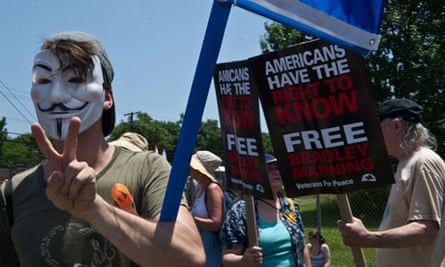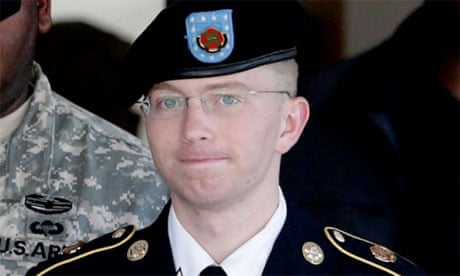The trial of Bradley Manning, the US soldier who leaked a trove of state secrets to WikiLeaks, could set an ominous precedent that will chill freedom of speech and turn the internet into a danger zone, legal experts have warned.
Of the 21 counts faced by the army private on Monday, at his trial at Fort Meade in Maryland, by far the most serious is that he knowingly gave intelligence information to al-Qaida by transmitting hundreds of thousands of classified documents to the open information website WikiLeaks. The leaked disclosures were first published by the Guardian and allied international newspapers.
Manning is accused of "aiding the enemy", in violation of Article 104 of the Uniform Code of Military Justice. By indirectly unleashing a torrent of secrets onto the internet, the prosecution alleges, he in effect made it available to Osama bin Laden and his cohorts, for them to inflict injury on the US.
Laurence Tribe, a Harvard professor who is considered to be the foremost liberal authority on constitutional law in the US and who taught the subject to President Barack Obama, told the Guardian that the charge could set a worrying precedent. He said: "Charging any individual with the extremely grave offense of 'aiding the enemy' on the basis of nothing beyond the fact that the individual posted leaked information on the web and thereby 'knowingly gave intelligence information' to whoever could gain access to it there, does indeed seem to break dangerous new ground."
Tribe, who advised the department of justice in Obama's first term, added that the trial could have "far-reaching consequences for chilling freedom of speech and rendering the internet a hazardous environment, well beyond any demonstrable national security interest."
"Aiding the enemy" carries the death penalty. Though the US government has indicated it will not seek that ultimate punishment, Manning still faces a maximum sentence of life in military custody with no chance of parole.
Daniel Ellsberg, who in 1971 was subjected to an aborted trial for leaking the Pentagon Papers on the Vietnam War to the New York Times, said that the Manning prosecution was far tougher than anything that he had endured.
"This is part of Obama's overall policy of criminalising investigative reporting on national security," he said. "If the government has its way, it will become very hard in future to expose official corruption or disclose information in the public interest other than leaks made by the administration itself."
Manning's trial, which is slated to last three months, opens against a backdrop of mounting unease about the increasingly aggressive stance the US government is taking against official leakers. The Obama administration has launched six prosecutions under the Espionage Act, twice as many as all previous presidencies combined, of which only Manning's has gone to trial.
The Department of Justice is already under fire for its controversial secret seizures of phone records of Associated Press reporters and of a Fox News reporter, James Rosen, investigating North Korean nuclear tests.

In the course of pre-trial hearings, military prosecutors have outlined the basic skeleton of their case against Manning. They will seek to show that Osama bin Laden personally instructed an aide to download elements of WikiLeaks, including the Afghan war logs, on to digital storage devices so that he could read them.
The court will hear – either in person at a secret session of the trial, or in an affidavit – from an anonymous witness called only "John Doe", who is believed to be one of the 22 US Navy Seals who killed Bin Laden in a raid on his compound in Abbottabad, Pakistan in May 2011. The witness will testify that he retrieved from the compound three items of digital media that contained WikiLeaks material.
The prosecution will present evidence to the court that the items retrieved from Bin Laden's compound included a letter written by the al-Qaida leader to an aide, asking for them to download US defence information from WikiLeaks. The same al-Qaida operative then replied to Bin Laden attaching the Afghan war logs and department of state information released by WikiLeaks.
Colonel Denise Lind, the judge presiding over the court martial in the absence of a jury, has ruled that for Manning to be found guilty of "aiding the enemy" the prosecution must prove beyond a reasonable doubt that he knowingly gave helpful information to al-Qaida, al-Qaida in the Arabian Peninsula and a third terrorist group whose identity remains classified. The route by which Manning communicated with al-Qaida can be indirect, through Wikileaks, the judge has directed, though the soldier must have had a "general evil intent in that he had to know he was dealing with an enemy of the United States".
A defence motion calling on all reference to al-Qaida to be ruled inadmissible on grounds that it was irrelevant and prejudicial was denied by Lind in an earlier hearing.
Manning has already pleaded guilty to lesser offences, that he transmitted classified information to WikiLeaks carrying a possible maximum sentence of 20 years. Between November 2009 and May 2010 he downloaded massive files, stored in secure US intelligence databases, from his computer at an army operating base in Iraq, where he was working as an intelligence analyst. He then transmitted the files to an encrypted whistleblower channel set up by WikiLeaks.
Jesselyn Radack of the Government Accountability Project, who represented two of the six leakers who have been prosecuted – National Security Agency whistleblower Thomas Drake and former CIA operative John Kiriakou – said the broad legal implications of Manning's trial were frightening. "If Osama bin Laden or any other suspected terrorist happens to have read a New York Times article on the internet, the government can now go after the paper for 'aiding the enemy'. That's a big problem."
In the course of legal argument in pre-trial hearings, one of the prosecution lawyers was asked whether Manning would have been prosecuted in the same way had he leaked to the New York Times as opposed to WikiLeaks. The prosecutor replied: "Yes."
Radack said that the case has sent a chill through investigative reporting. Several potential whistleblowers have approached her in recent weeks, she said, expressing great trepidation about leaking to any news outlets because "they fear they will become the next Bradley Manning".






Comments (…)
Sign in or create your Guardian account to join the discussion